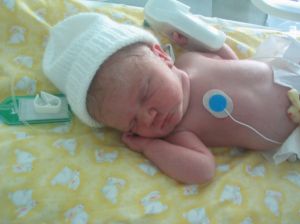Low Birthweights Found in 1 of 12 Babies
About 1 out of every 12 babies born in the United States are born with what is considered to be a low birthweight. A low birthweight is anything below 5 pounds 8 ounces, and approximately 67 percent of all low birthweight babies are born premature. Babies can be born with a low birthweight for a variety of reasons, including developmental ones. The health of the mother can also be a factor. Regardless of the reason why a baby is born with a low birthweight, there can be very serious medical problems as a result of their low weight. The lower the birthweight, the higher the chance of a medical complication arising.

Respiratory Distress Syndrome (RDS)
RDS is a breathing problem common to babies born with a low birthweight or if they were born prior to week 34. Babies with this syndrome can suffer a collapsed lung and require the use of a mechanical respirator in order to breathe properly. Once their lungs mature, they typically recover.
Intraventricular Hemorrhage (IVH)
Also referred to as bleeding in the brain, IVH can occur in some premature babies if they are born with a very low birthweight. It is typically identified by an ultrasound, and typically only occurs within the first three days of life. In most cases, brain bleeds are not serious and they resolve themselves. In more severe cases, the blood can cause pressure on the brain, which may result in brain damage. A tiny tube can be surgically inserted into the brain to relive the pressure, or in some cases medications can reduce the amount of fluid on the brain.
Patent Ductus Arteriosus (PDA)
PDA is a common heart problem found in premature and low birthweight babies. Until the baby is born, a large artery moves blood around the baby’s lungs, which aren’t working yet. This artery typically closes shortly after birth so that
the blood can travel normally through the lungs to become oxygenated. If this artery does not close, however, it can lead to heart failure. There are medications to help this artery close, but the most severe cases often require surgery to close the artery.